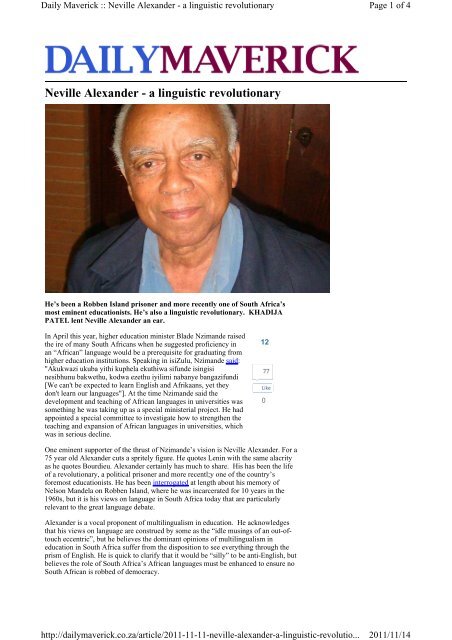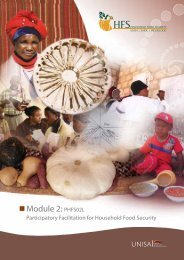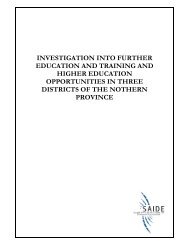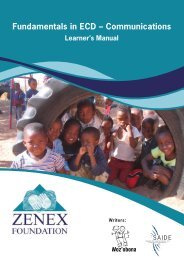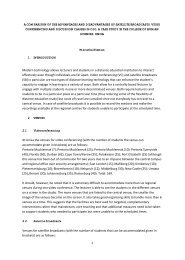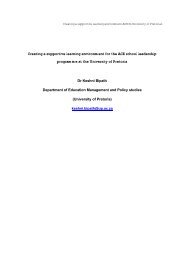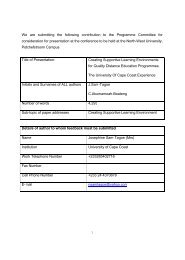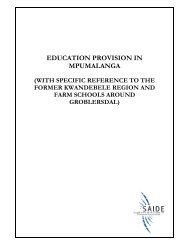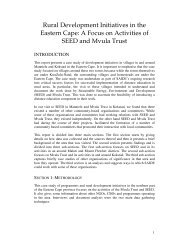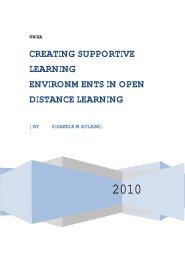Neville Alexander - a linguistic revolutionary - Saide Blog
Neville Alexander - a linguistic revolutionary - Saide Blog
Neville Alexander - a linguistic revolutionary - Saide Blog
Create successful ePaper yourself
Turn your PDF publications into a flip-book with our unique Google optimized e-Paper software.
Daily Maverick :: <strong>Neville</strong> <strong>Alexander</strong> - a <strong>linguistic</strong> <strong>revolutionary</strong>http://dailymaverick.co.za/article/2011-11-11-neville-alexander-a-<strong>linguistic</strong>-revolutio...Page 1 of 42011/11/14<strong>Neville</strong> <strong>Alexander</strong> - a <strong>linguistic</strong> <strong>revolutionary</strong>He’s been a Robben Island prisoner and more recently one of South Africa’smost eminent educationists. He’s also a <strong>linguistic</strong> <strong>revolutionary</strong>. KHADIJAPATEL lent <strong>Neville</strong> <strong>Alexander</strong> an ear.In April this year, higher education minister Blade Nzimande raisedthe ire of many South Africans when he suggested proficiency inan “African” language would be a prerequisite for graduating fromhigher education institutions. Speaking in isiZulu, Nzimande said:"Akukwazi ukuba yithi kuphela ekuthiwa sifunde isingisinesibhunu bakwethu, kodwa ezethu iyilimi nabanye bangazifundi[We can't be expected to learn English and Afrikaans, yet theydon't learn our languages"]. At the time Nzimande said thedevelopment and teaching of African languages in universities wassomething he was taking up as a special ministerial project. He hadappointed a special committee to investigate how to strengthen theteaching and expansion of African languages in universities, whichwas in serious decline.12Like0One eminent supporter of the thrust of Nzimande’s vision is <strong>Neville</strong> <strong>Alexander</strong>. For a75 year old <strong>Alexander</strong> cuts a spritely figure. He quotes Lenin with the same alacrityas he quotes Bourdieu. <strong>Alexander</strong> certainly has much to share. His has been the lifeof a <strong>revolutionary</strong>, a political prisoner and more recentl;y one of the country’sforemost educationists. He has been interrogated at length about his memory ofNelson Mandela on Robben Island, where he was incarcerated for 10 years in the1960s, but it is his views on language in South Africa today that are particularlyrelevant to the great language debate.<strong>Alexander</strong> is a vocal proponent of multilingualism in education. He acknowledgesthat his views on language are construed by some as the “idle musings of an out-oftoucheccentric”, but he believes the dominant opinions of multilingualism ineducation in South Africa suffer from the disposition to see everything through theprism of English. He is quick to clarify that it would be “silly” to be anti-English, butbelieves the role of South Africa’s African languages must be enhanced to ensure noSouth African is robbed of democracy.
Daily Maverick :: <strong>Neville</strong> <strong>Alexander</strong> - a <strong>linguistic</strong> <strong>revolutionary</strong>http://dailymaverick.co.za/article/2011-11-11-neville-alexander-a-<strong>linguistic</strong>-revolutio...Page 2 of 42011/11/14<strong>Alexander</strong> certainly kowtows to no one, not even himself. He assisted in theformulation of South Africa’s language policies, but now admits that too manycompromises were made with former minister of education Kader Asmal particularlyin the role of African languages in higher education. He describes the embarrassingfailure of South Africa to ensure mother-tongue education to all its citizens as aproduct of “neo-apartheid” language policies.<strong>Alexander</strong> admirably resists that great South African inclination to reduce everyargument to race. His is a consistent leaning towards the principles of non-racialism.Yet, in a fleeting moment he invokes memories of a young, South African<strong>revolutionary</strong> try-hard. “The means of production and exchange,” he says, “are tiedinto language.” His Marxist ideologies quite aside, <strong>Alexander</strong> raises an integral pointabout the relationship between language and the economy. “Unless we have spaceswhere people use languages they know best, productivity and efficiency will continueto suffer,” he says. “It has become an axiom that you give instruction in Afrikaans orEnglish, but if people are able to understand immediately the nuance of theinstruction received it will improve efficiency.” He stresses, “Language is built intothe economic structures of society.”And while many lament the lack of economic value attached to African languages inSouth Africa, <strong>Alexander</strong> points out that the country’s informal sector is grounded inthe African languages. “African languages have potential,” he says. “They areeconomically lucrative and to think otherwise is to assume an elitist position.”<strong>Alexander</strong> stresses that the need for further research into the tropes of the relationshipbetween language and the economy in South Africa. He underscores as well the roleof language in upholding human dignity. He points out that the denial of the rights ofa people to use their languages in public life invariably leads to conflict and adds thatAfrikaans cannot be made the scapegoat for apartheid.<strong>Alexander</strong> emphasises that the political and cultural leadership must have the visionand the political will to make sure English does not continue to operate as the defacto only official language. “We have to begin to use other African languages inpowerful ways,” he says. Participation in public life hinges on the ability to articulateyourself in the language you know best.The Constitution of the country certainly accords the same status to English as it doesto isiZulu. They are both official languages. Yet in the important work of governingthe country even the President chooses English over his own mother tongue, often tohis own detriment.On the lawns of the Presidential Guesthouse in Pretoria journalists have shared agiggle about Zuma’s public speaking gaffes. I share with <strong>Alexander</strong> the story ofZuma addressing a press pack during a recent European Union-South Africa summitat the Kruger National Park. Zuma was meant to describe the relationship betweenSouth Africa and the EU as a “burgeoning” one, but mangled the pronunciation of“burgeoning” into something that sounded closer to “berg-onioning”. The assemblednewshounds decided that his speechwriters should certainly not pepper his speecheswith such lofty language. <strong>Alexander</strong> points out that Zuma should be able to useisiZulu in such settings, but ultimately the development of African languages arehamstrung by a perception of inferiority. “African languages,” <strong>Alexander</strong> argues,“must be accorded cultural capital.”There is merit to Nzimande’s plan to compel students to learn an African language,but <strong>Alexander</strong> believes that African languages must be introduced to students longbefore they enter universities. And eventually it will not be the work of governmentalone to grant African languages the much-needed cultural capital. “It will take asocial movement,” <strong>Alexander</strong> concludes. DM
Daily Maverick :: <strong>Neville</strong> <strong>Alexander</strong> - a <strong>linguistic</strong> <strong>revolutionary</strong>http://dailymaverick.co.za/article/2011-11-11-neville-alexander-a-<strong>linguistic</strong>-revolutio...Page 3 of 42011/11/14Read more:• Viva Blade for reigniting the language debate in Daily Maverick;• How an Ethiopian slave became a South African teacher in BBC News.Friday 11 November, 201112Like77Send0In South Africa, not many people know how France has, in less than 100 years,imposed French as the language of the people, wiping out hundreds of smalllanguages as it has done so. At the same time it has used French as a tool ofinternational diplomacy (the last two French presidents are and were fluent inEnglish, but the number of times they have been caught speaking it in public can becounted on one hand).The drive to impose French came with the First World War when it was realised thatunits speaking what is now called "patois" but which in fact were well developedlanguages, did not understand orders in French.Many 80 year olds will tell you the first time they spoke French was when they wentto school, but now their children and more especially their grandchildren have noknowledge of their (the 80 year-olds) mother tongue.Using French for international diplomacy comes from De Gaulle, it was one of theways he resisted the Americans, who, remember, wanted an US led occupationgovernment after D Day.In the context of 2011, Zuma could only use isiZulu for official speeches, especiallyinternational ones, just as Sarkozy only uses French. Equally Mbeki and Mandelacould have used Xhosa.It would be a symbol, and have the by-product of boosting isiZulu in universitiesoffering translation degrees -- is it not a bit strange that the global academic centre oflearning for isiZulu is the University of London?How it will play in South Africa is another question -- the fear of tribal violence stillexists.John Patson on Fri, 11 Nov 2011 at 11:37All kids should learn three languages at school, their home one and two others oftheir choice and in one generation we will have a much more tolertant multi culturalsociety.BrentBrent Mckeon on Fri, 11 Nov 2011 at 12:50As a South African I revel in the language diversity of my country. Having been bornand educated in the old bi-lingual paradigm and although I am English speaking andlive in an English speaking environment I happily listen to Afrikaans radio and onoccasion read Afrikaans media as well. I also have a smattering of isiZulu picked upperforce from the age of 10 when my parents went farming in KZN. Sadly peopleborn and educated in mono lingual countries actually miss out on some of great therichness of human life. English seems to be becoming the national language of
Daily Maverick :: <strong>Neville</strong> <strong>Alexander</strong> - a <strong>linguistic</strong> <strong>revolutionary</strong>http://dailymaverick.co.za/article/2011-11-11-neville-alexander-a-<strong>linguistic</strong>-revolutio...Page 4 of 42011/11/14administration and it also gives access to the international world however ourprovinces each have a preponderance of one or more other languages and theseshould most definitely be taught in the province's schools.Rory Short on Fri, 11 Nov 2011 at 18:34Copyright 2011. All rights reserved.


